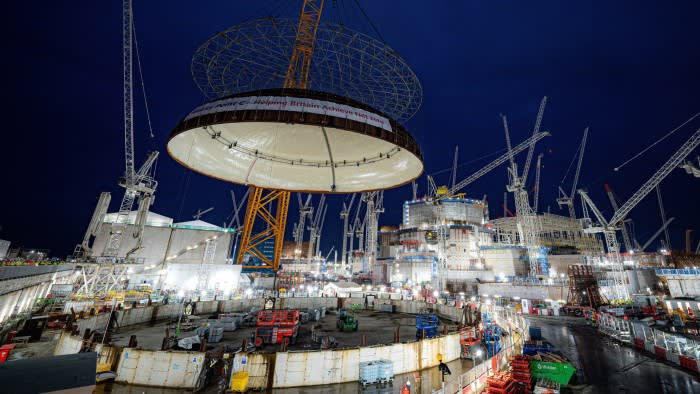Unlock the Editor’s Digest for free
Roula Khalaf, Editor of the FT, selects her favourite stories in this weekly newsletter.
Britain’s flagship Hinkley Point C nuclear plant has been delayed until 2029 at the earliest and could end up costing up to £35bn, or nearly twice the initial budget, in the latest blow to a project meant to kick-start the country’s nuclear revival.
The spiralling bill and slipping schedule, announced on Tuesday by the French state-owned operator and constructor EDF, will put pressure on the UK government to provide extra financial support for the struggling scheme which lies at the heart of long-term energy plans.
EDF, which has also experienced long delays on recent parallel projects in Finland and France that use the same reactor technology, said the project could slip until 2031, blaming the complexity of installing electromechanical systems and intricate piping at Hinkley, the design for which it had only recently finalised.
It was previously held up by delays due to the Covid-19 pandemic.
But the latest setbacks come on top of broader concerns among some critics of the low-carbon technology over whether the sector is well equipped to deliver on time and on budget in the decades to come as a nuclear revival gets under way, including with more plants planned in Britain.
Experienced workers left the industry after a lull in projects following the 2011 Fukushima accident in Japan, and labour shortages were one of the issues at Hinkley, a person close to the project said.
“We have found civil construction slower than we hoped and faced inflation, labour and material shortages,” EDF said in a note to Hinkley project staff.
Under EDF’s latest scenario, one of the two planned reactors in Somerset could be ready in 2029, a two year-delay compared with the company’s previous estimate of 2027. But, in adverse conditions, that could drag on until 2031, EDF warned. It did not give an estimate for the second reactor.
The bill, meanwhile, will reach £31-35bn based on 2015 prices and depending on when the plant is completed. That compares to an initial budget of £18bn and original completion date of 2025.
The success of Hinkley, which is expected to provide power for more than 5mn homes, is crucial for the UK’s future energy provision.
The twin-reactor scheme in Somerset is the first in a new generation of nuclear power stations intended to provide “baseload” electricity as the UK becomes more dependent on intermittent renewable energy from the wind and sun.
But while construction has begun at Hinkley Point C — in contrast to other potential sites such as Sizewell in Suffolk — progress has been sluggish.
The former chief executive of EDF, Vincent de Rivaz, had boasted in 2007 that by 2017 people would be able to cook their Christmas turkeys using electricity from Hinkley.
From the outset there have also been concerns over budget — EDF’s finance chief resigned in 2016 over the decision to press on with the project, saying it would put EDF’s financial future in jeopardy.
EDF ended up being fully nationalised by the French state last year, in part because of huge losses after it suffered outages at existing reactors in France and was also made to foot the bill for shielding domestic consumers from power price rises during Europe’s energy crisis.
The latest Hinkley cost overruns now pose further financial problems. EDF’s junior investment partner on the project, CGN of China, had agreed to finance 33.5 per cent of the original cost.
But, after paying its contracted share, the Chinese group is now refusing to make further payments related to cost overruns on the site after it was in effect pushed out of other future nuclear schemes at Bradwell and Sizewell as relations between London and Beijing deteriorated.
EDF and the French government are seeking ways for Britain also to fund the higher construction costs, people close to the discussions have said. The UK has, so far, said it had no intention of doing so.
